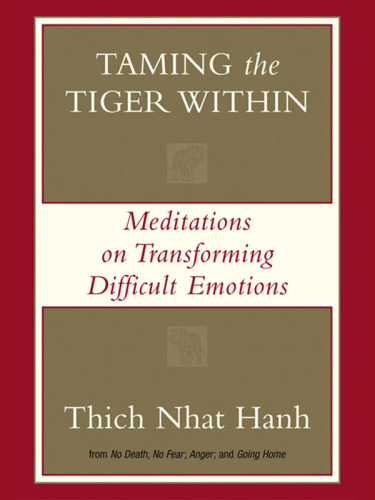
Taming the Tiger Within
Meditations on Transforming Difficult Emotions
کتاب های مرتبط
- اطلاعات
- نقد و بررسی
- دیدگاه کاربران
نقد و بررسی

November 1, 2004
Vietnamese Zen Buddhist master Thich Nhat Hanh has authored three national bestsellers that deal with negative emotions: Anger, Going Home and No Death, No Fear. Here he distills some of the best quotations from those three books, offering advice on how to conquer rage, jealousy, fear and the desire for revenge. Often the thoughts are just a sentence long, and rarely more than three; the book is designed to be savored over time through deep reflection. Some of Hanh's suggestions are practical (such as walking to diffuse anger or writing a love letter to a cherished individual), while others will require more rumination. One key to reducing anger, for example, is to practice "deep looking" and recognize that all beings are interconnected; the angry person is inextricably intertwined with the one she imagines is her enemy. Though spare, even Spartan, this book holds seeds of profound wisdom. However, more serious readers will want to delve into the three classics that this book draws upon, since they are already accessible, brief and easy to understand.

November 22, 2004
Vietnamese Zen Buddhist master Thich Nhat Hanh has authored three national bestsellers that deal with negative emotions: Anger, Going Home and No Death, No Fear. Here he distills some of the best quotations from those three books, offering advice on how to conquer rage, jealousy, fear and the desire for revenge. Often the thoughts are just a sentence long, and rarely more than three; the book is designed to be savored over time through deep reflection. Some of Hanh's suggestions are practical (such as walking to diffuse anger or writing a love letter to a cherished individual), while others will require more rumination. One key to reducing anger, for example, is to practice "deep looking" and recognize that all beings are interconnected; the angry person is inextricably intertwined with the one she imagines is her enemy. Though spare, even Spartan, this book holds seeds of profound wisdom. However, more serious readers will want to delve into the three classics that this book draws upon, since they are already accessible, brief and easy to understand.
Copyright 2004 Library Journal, LLC Used with permission.

























دیدگاه کاربران